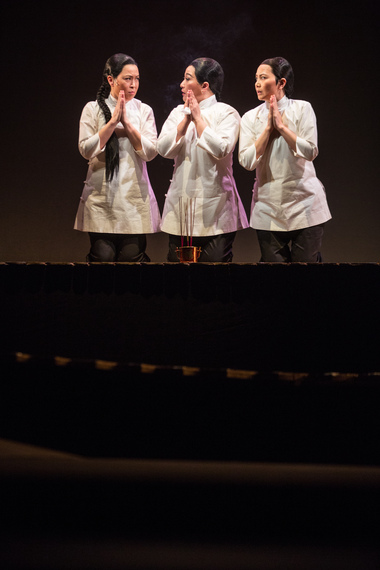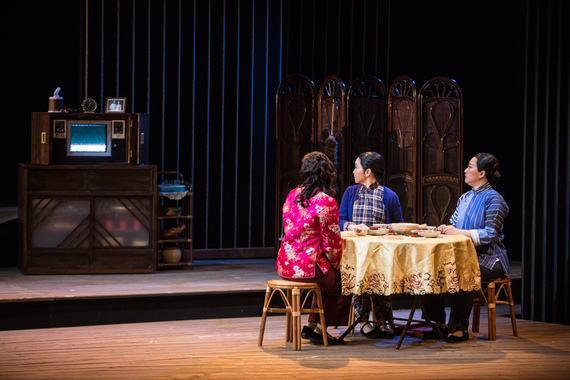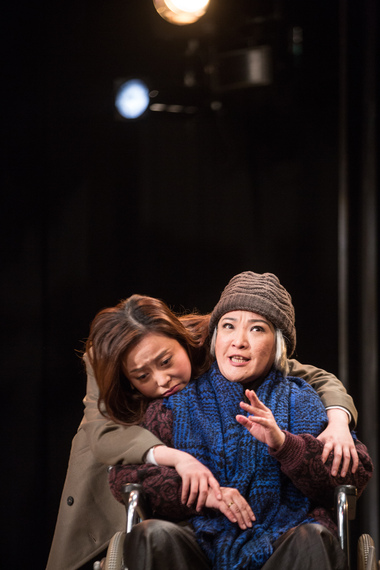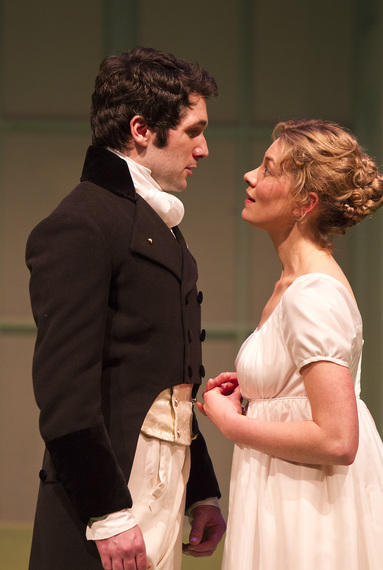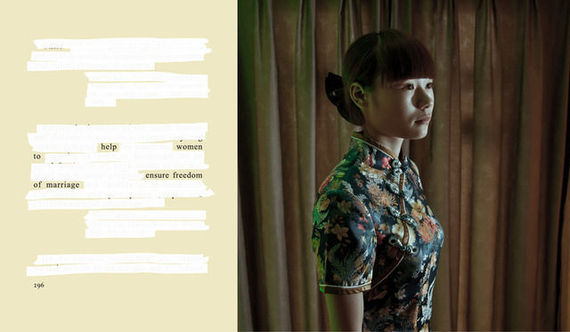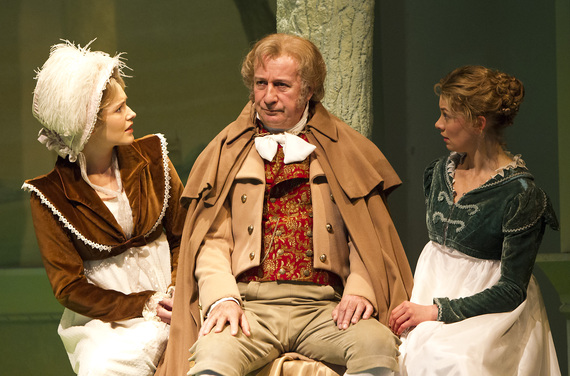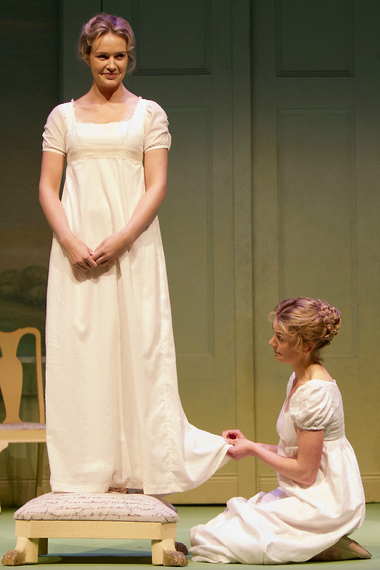Ballet to the People celebrated International Women's Day this year at back-to-back performances of two plays stamped with their own distinctive brands of feminism at the Hong Kong Arts Festival. Dublin's Gate Theatre brought its classic production of Pride and Prejudice to Hong Kong, while the Festival commissioned The Amahs from filmmaker Roger Lee Yan-lam and playwright Wong Wing-sze -- to commemorate a generation of women, poor and mostly illiterate, who, upon the decline of the handspun silk industry in China in the first half of the 1900s, migrated to Hong Kong and elsewhere to work as servants in the households of wealthy Chinese and expatriates. While many were treated by their employers as part of the family, the work was back-breaking and abuse was common, particularly in the manner in which girls and women were often bought and sold.
Today, news of abuse of household servants in Hong Kong still makes headlines -- though, with the rise in mainland living standards, and a clampdown on the trafficking of mui tsai from China in the latter part of the 20th century, the abused today are mostly migrants from the Philippines and Indonesia, abetted by governments desperate for their foreign currency remittances. Working conditions and contractual guarantees are far better in Hong Kong than in the Middle East and countries like Japan, but a damning report from Amnesty International highlights the lack of enforcement and an unwillingness by abused workers to come forward.
The Amahs follows the adventures of three determined women who make a chance acquaintance in Hong Kong and swear sisterhood. The formidable acting talents of Alice Lau as the stern, authoritative Kim, Pang Hang-ying as the soft-hearted and gullible Ho, and Louisa So as the fragile but stubborn Lan, transcend stereotypes of Cantonese soap opera. Their characters and storylines are brilliantly offset by the struggles of Kimmy, the luminous Shirley Tsoi in the role of Lan's daughter, a young, professional, single woman in modern-day Hong Kong. There is little action in this handsome staging -- the cast is restricted to the four women, who essentially narrate their brave, funny, and tragic stories -- but it is the interaction between them that keeps us riveted.
Just as Jane Austen was a Marxist before Marx and a feminist before Emmeline Pankhurst went on hunger strike and before Germaine Greer persuaded us that men teach women to hate themselves, the amahs turned out to be pioneers. They had no illusions about men and strove to be independent of them -- often vowing celibacy and devoting themselves to the families they served, and to their amah sisters.
Jane Austen never married (though she came close). It may be no surprise, given her scathing, and uproarious, descriptions of the marital state in Pride and Prejudice. From her pen flowed these juicy thoughts on the subject, delivered by the pragmatic Charlotte Lucas:
Happiness in marriage is entirely a matter of chance. If the dispositions of
the parties are ever so well known to each other, or ever so similar
beforehand, it does not advance their felicity in the least. They always
contrive to grow sufficiently unlike afterwards to have their share of
vexation, and it is better to know as little as possible of the defects of the
person with whom you are to pass your life.
The world is grateful Austen avoided marriage, as it freed her up to write.
Her decision to marry off her redoubtable heroine to old money in the final pages of Pride and Prejudice may strike some as an anti-feminist resolution; certainly the banal, sunny touch with which this is accomplished in the Gate's production obscures the feminist irony of this final stroke. In that era, a woman in Elizabeth Bennet's situation had only two options: to marry well, or consign herself to the dreary occupation of a spinster governess. Marrying well may have robbed Lizzy of her freedom and thrust her permanently into the sphere of the insufferable Lady Catherine de Bourgh, but this was the high price she had to pay to secure her future.
The Gate Theatre plays this tale as a broad comedy of manners, with greater earnestness than we find in Austen's barbed writing. The worldly Hong Kong audience chuckled appreciatively at Mrs. Bennet's fixation with the income of her daughters' suitors, and at the scrutiny of their valuable property holdings.
The highlights of this unevenly paced production were the sparring between the hysterical Mrs. Bennet and her witty, long-suffering husband - brilliantly played by Marion O'Dwyer and Stephen Brennan - and the scenes in which our cheeky heroine Elizabeth (Lorna Quinn) rebuffs awkward marriage proposals from the business-minded Mr. Collins (the hilarious, twitchy Mark O'Regan) and the pompous Darcy (Sam O'Mahony), and in which she stands up to the imperious Lady Catherine (Deirdre Donnelly).
O'Mahony gives Colin Firth a run for his money in the role of Darcy, even without having to drag himself out of a lake in a wet shirt. The gold standard for the Elizabeth Bennet portrayal these days belongs to the austere yet fiery Anna Maxwell Martin, who appeared in the imaginative mystery thriller, Death Comes to Pemberley, the television adaption of the sequel penned by P.D. James, that first aired a little over a year ago. Quinn is, in comparison, a trifle too dizzy.
Yet she is quietly moving in the scenes of sisterhood.
Lizzy's three younger sisters are royal pains. The solidarity, however, between Lizzy and her lovely, noble-hearted sister Jane (Aoibhín Garrihy), and between Lizzy and her slightly awkward friend Charlotte (Maeve Fitzgerald) form the emotional and moral core of the play. Garrihy is absolutely perfect as Jane, and Fitzgerald turns in a finely nuanced performance, both comic and touching.
Opening tonight and running through March 14th at the Hong Kong Arts Festival is yet another amusing representation of sisterhood. Christopher Wheeldon's Cinderella - created for both the Dutch National Ballet and San Francisco Ballet (reviewed here) and presented in Hong Kong by the Dutch National - creates vivid characters for his heroine's stepsisters, beyond the usual cartoonish roles, and resolves the tension between Cinderella and her stepsisters very neatly at the end.

